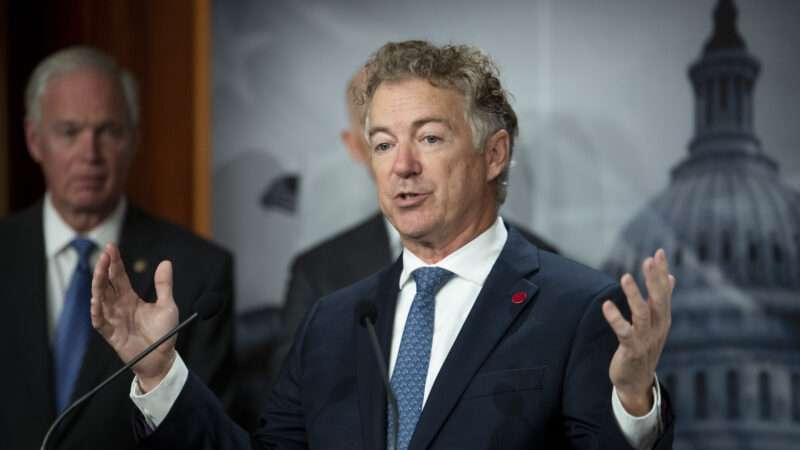
The first major test for the new Republican majority in the House is the looming crisis involving the debt ceiling, which GOP lawmakers say they won't vote to raise unless Democrats, including President Joe Biden, agree to cut spending.
And the first major test of whether Republicans are serious about cutting spending is their ability to identify anything they'd actually be willing to cut.
So far, that part has been the problem.
Case in point, here's Rep. Marjorie Taylor Greene (R–Ga.) explaining the House GOP's demands to NBC News earlier this week: "There's gotta be cuts in spending. That has to happen." So far, so good. But when a reporter followed up by asking what cuts Taylor Greene would support, the congresswoman responded by saying "I haven't really formulated an exact list."
OK, maybe that's somewhat unfair. Taylor Greene is, after all, known more for her willingness to engage in ridiculous conspiracy theories and culture warring than for her policy chops. But the same conundrum seems to afflict a wide swath of Republicans, who have so far done a better job of identifying what they refuse to cut—Social Security, Medicare, or military spending—than specifying what they'd be willing to put on the chopping block.
"Republicans have Very Serious budget demands. Unfortunately, they can't identify what any of those demands are," summarizes The Washington Post's Catherine Rampell. "Republicans say they want lower deficits—in fact, they have pledged to balance the budget (that is, no deficit at all) within seven or 10 years. But they have not laid out any plausible mathematical path for arriving at that destination."
The closest thing there is to an actual plan is a one-page document published by the Republican Study Committee. It promises to balance the federal budget by the end of the decade by making "common-sense reforms to reduce spending & the associated inflation."
What are those reforms? ¯\_(ツ)_/¯
The fundamental problem for Republicans is that it's virtually impossible to balance the budget without cutting entitlements or the military. In fact, you'd have to cut 85 percent of the rest of the federal budget, according to an analysis by the Committee for a Responsible Federal Budget, which advocates for lower deficits.
As much fun as that might be to watch, it's simply not politically possible.
Which means there is only one way forward, a way outlined on Wednesday by Sen. Rand Paul (R–Ky.).
"We have an opportunity here. It could be done. But it would take compromise between both parties," Paul said during a brief press conference held by a group of Senate Republicans. "Republicans would have to give up the sacred cow that says we will never touch a dollar in military [spending], and the Democrats would have to give up the sacred cow that they will never touch a dollar in welfare."
Yes, Republicans. The time has come to admit that budget cuts will have to hit the Pentagon too.
As well they should. If any other department of the government couldn't account for billions of dollars in assets and had never successfully passed an audit, it would be placed right at the top of the list of wasteful spending that Republicans wanted to cut. And they'd be right to do that!
Dress a welfare program in camouflage, however, and it suddenly becomes an untouchable asset. It's unpatriotic to even suggest that perhaps military contractors shouldn't get to attach 3,800 percent markups on spare parts or that the nation will still be secure if we don't blow $1.7 trillion on new fighter jets that might never work.
Remember how we finally ended the war in Afghanistan in 2021? You wouldn't know it by looking at the military budget, which has continued increasing even as the war on terror winds down. "The Congressional Budget Office has determined that, if current trends continue, the Pentagon could receive a monumental $7.3 trillion-plus over the next decade, more than was spent during the peak decade of the Afghan and Iraq wars, when there were up to 190,000 American troops in those two countries alone," wrote William Hurtung, a senior research fellow at the Quincy Institute, which advocates for a more realistic U.S. foreign policy, last year.
Republicans need a plan to cut spending? Here's one. The Center for International Policy, a foreign policy think tank, has outlined how the military budget could be trimmed by $1.2 trillion over the next 10 years by doing stuff conservative Republicans say they want, like avoiding foreign wars and cutting bureaucracy.
These aren't radical ideas. They should be a necessary part of any discussion about reducing the deficit and managing the bloated national debt. And, unlike changes to Social Security—which should also be on the table—they wouldn't significantly impact the working-class voters that Republicans are increasingly trying to court. No one in western Pennsylvania or eastern Kentucky is going to get upset about military-industrial contractors living in Fairfax County McMansions getting slightly less wealthy over the next decade.
"Everything would have to be looked at across the board. No one has a sacred area that would be immune," Paul said. "It's a responsible thing to do."
He's right. But it can only happen if Republicans admit that protecting the military budget from possible cuts makes little fiscal or political sense.
The post If Republicans Want To Cut Spending, They Should Start With the Pentagon appeared first on Reason.com.







